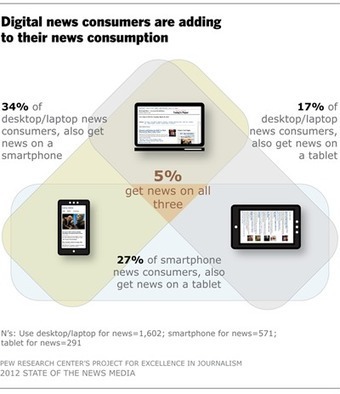 Your new post is loading...
 Your new post is loading...
Yesterday I quoted my old boss at the New Statesman. Today it’s Jon Snow, Channel 4 News presenter and Charlie Beckett who now runs Polis at the London School of Economics and was previously a programme editor at Channel 4 News. Both had interesting things to say about the evolution of news in the networked age. Both were talking heads in the final part of Steve Richards’ Making News series on Radio 4....
Natural disasters, airline crashes — and yes, terrorist bombs — undercut the normalcy of everyday life by bringing death’s whammy to an unexpected place at an unforeseen time. In the hours and days following such catastrophes, journalists work to restore normalcy to the panicked population by explaining how and why the bad thing happened and how to prevent it from happening again. Reporters have been normalizing the abnormal for so long that they’ve created well-worn catastrophe templates to convey their stories. Yesterday, while covering the Boston Marathon bombing, journalists leaned hard again on those templates. First came the sputtering dispatches over radio and television about the calamity. Next up were the on-the-scene broadcast reports, frequently marred by confusion and contradiction, as the press held out hope for survivors but prepared audiences for the worst. Video of the catastrophe was converted by the cable news networks into a perpetual loop, giving the talking heads a wallpaper background to talk over (and giving new viewers just tuning in something graphic to watch)....
Today’s annual report on the State of the News Media shows that new technologies really are pressing journalists to do much more with much less. Last week, we learned that newspaper industry ad revenue was down 7.3 percent this year to its lowest level since 1984 (or 1954, adjusted for inflation). As a result, newsrooms continue to shrink. But The Project For Excellence in Journalism’s report shows us that the needs and demands of the audience are growing and fragmenting. Social media is an important source of news, the report says, but remains smaller and only “supplemental” to other discovery methods like directly visiting a news website, searching the Web or browsing an aggregator....
Don't be fooled by evangelists of 'free': editorial ethics and real reporting have been blown up along with the business model. Over at Slate the other day, Matthew Yglesias argued that journalism consumers are enjoying a "golden age". Yeah, sort of – in exactly the way looters enjoy an improved standard of living. Problem is, it only stays improved until the store is emptied out.
The news industry has gone from being obscenely profitable to slightly profitable to – at least, in the case of newspapers – largely unprofitable. All of that fantastic content Yglesias was gushing about is paid for by venture capitalists making bad bets, established media companies digging into their savings accounts to pay the bills, displaced workers earning peanuts, amateurs, semi-pros, volunteers and monks.
I would say that the business model is unsustainable, but losing money is not a business model. It is a going-out-of-business model....
The ticking time bomb that has defined the intersection of print and digital publishing went off over the past few weeks. It’s not the fault of any executive, technology or business model. It’s simply the beginning of a new cycle of magazine content and delivery. It you love magazines, it’s all about discovery and great value right now. If you don’t like magazines, this explosion increases the chances that you just might change your mind. Think about this: We’re coming off a week in which one of the world’s biggest publishing companies (Time Inc.) tried to sell its library to another of the world’s biggest publishing companies (Meredith). The deal fell apart. And in the same week, another global giant (News Corp) announced that its newly spun-off publishing division will get a $2.5 billion cash infusion, some of which will spawn a new WSJ.Money print magazine, and some of which will go to digital newspaper publishing. This mass change, growth, and implosion is the reality for publishers over the next few years. It’s print vs. digital, and a game of survival of the fittest. Behind the scenes, some publishing executives are clinging to the vision that print will still be the best business magazine model for the right content and the right audience. And then others are seeing the dramatic changes with the long-term view that digital models will win out. This is happening faster than most people think....
Newspapers will never be the same. But what happens to democracy if the Web business model can't fund journalism? ...The assumption is that there has to be a way to make profits doing digital journalism if journalists and owners simply wise up and get with the program. Over the past few years, many American newspapers have been purchased on the cheap by hedge funds—nearly a third of the twenty-five largest dailies are now so owned—the subtext being that these business geniuses can generate profits where dummkopf journalism industry types have failed. As John Paton, the journalist-cum-CEO for a newspaper company purchased by the Alden Global Capital hedge fund in 2011, put it: “We have had 15 years to figure out the web and, as an industry, we newspaper people are no good at it.” Apparently, neither are the hedge fund managers. David Carr wrote in July 2012 that “hedge funds, which thought they had bought in at the bottom, are scrambling for exits that don’t exist.”...
When everyone has the ability to blog, tweet and publish, traditional media have a greater responsibility to provide ethical, credible journalism. That was a message that emerged from the World Summit on the Information Society (WSIS) conference taking place this week at UNESCO headquarters in Paris.
In the context of the Summit’s discussions on ethics, the World Association of Newspapers and News Publishers (WAN-IFRA) and the World Editors Forum (WEF) panel focused on the role of traditional media in the digital age.
In the digital environment, when the source of information is often unknown, it becomes more difficult to determine credibility. Is the source supporting a hidden point of view? Is the blogger offering to promote products for a fee? Does the ethical culture transfer to the online environment? The panelists explored how the tenets of traditional media - quality editorial, credibility and ethical reporting, and investigative journalism – translate in the new media landscape....
|
Guardian digital development editor Joanna Geary answers some questions about GuardianWitness.... ...First up: this was built in two months. The sponsorship pot from EE gave them a budget and time to get the job done, but not necessarily have everything they wanted at launch. She says it's a complete, working system that can be built upon. I suggest the phrase "minimum viable product" to Jo but she suggests that it's a full product - one that will be built on. Do they have aspirations for more integration with social media? Yes, they do. And it's something they're looking at as the system develops. The key part of the development which is invisible to us right now is that the Guardian Witness system is deeply integrated with the Guardian's CMS. Once the content has passed through verification, it's available to the journalists, and they can insert it into a story or liveblog just by inserting an URL, which creates an embedded version of the contribution that links back to the contributor's profile. "The really exciting thing is not what you see now, but what you see when Witness is included in a story," she says. It's a tool to facilitate genuine collaborative working between the journalist and external witnesses. Jo says they'll collaborate with people on the ground, or with expert knowledge, in any way they can - and already do, via phone and other traditional methods. This adds another tool for doing that....
Terrible events such as yesterday’s bombings at the Boston Marathon have always meant “all hands on deck” for news organizations, with staffers pulled off their regular beats to contribute. But the endpoint of the newsgathering and reporting is no longer a front-page package of stories explaining — the best one can — what happened, why it happened and what might be next. Now, there is no endpoint — events are reported in real time, with stories in constant motion, and the front page is a snapshot of an organization’s reporting at the moment when the presses needed to roll. Boston was a reminder of that, and a look at what’s changing in real-time journalism. Through Twitter and various live blogs, I found myself looking over my shoulder at the Boston Globe, the New York Times, Reuters and other news organizations, and was able to make some observations and draw some conclusions....
...You can access the app via the Web, but there’s also native incarnations for Android and iOS. To contribute content to GuardianWitness, you need to create an account, either using your existing Guardian credentials, or through your Facebook and Twitter details. The Guardian actually posts ‘assignments’, inviting users to post content based on themes – for example, when Britain experiences unseasonably bad weather. Editors set a range of assignments each week, covering news, sport, culture and life and style....
Or, put another way still, the paywall, other than providing a bit more time to wrestle with the underlining problems of newspapers, does not solve any of them. Even with this new class of free-spending readers, the economic problems remain exactly the same: • An extraordinary indifference, if not utter lack of interest, on the part of younger people to news brands and to news habits, a development that established news organizations have been unable to address, stall, or even fathom. • Dramatic abandonment of the medium by traditional advertisers, such that, since 2007, newspapers, according to industry monitor group Outsell, have seen more than a 40% decline in overall income, the overwhelming amount of that drop due to lost ad revenues....
Des Moines-based Meredith, best known for Better Homes and Gardens, has discovered the secret to keeping magazines profitable... Meredith has profited from a few key strategies. They are experts at repurposing their content across multiple platforms (magazines, books, websites, mobile devices, tablets, etc.) and aggressively look beyond advertising and circulation for revenue. In print, they stay as far away from the news as possible. They are particularly successful at licensing their magazine titles’ names to major national businesses selling branded products; they also run their own marketing agency. Meredith hasn’t been immune to the forces battering the industry. But over the past decade, by strategically tweaking their portfolio, they’ve managed to maintain steady profits and reliable margins year after year in spite of the turbulence. (Lacy declined to comment.) In February, Meredith published one of its signature editorial products—a “bookazine” called Chicken Dinners. It was flush with ads, co-branded under the Better Homes and Gardens imprimatur, and sold with no expiration date. In theory, it could live on a newsstand—or a coffee table or a kitchen counter—for many months. “Chicken Dinners is Chicken Dinners whether you buy it in May, June, or July,” says Samir Husni, the director of the Magazine Innovation Center at the University of Mississippi. Some 88 years after Harold Ross launched The New Yorker with the pitch that it was “not edited for the old lady in Dubuque,” Iowa is turning into a surprising seat of power....
We've all seen how profoundly the Internet has disrupted industries such as music, travel and even florists. But what's easy to miss is that it's not even close to finished yet. In fact, the Internet's impact is just getting started in most other industries. And it's also revolutionizing business practices across all industries. One of these is marketing. Yet most companies have no idea of how big a change digital is bringing, and they certainly aren't prepared for what's coming. As with any such change however, there are opportunities as well as threats. The companies that are aware of the transition and find ways to use it to their advantage will be the net beneficiaries. Those that do not are likely to slowly fade into obscurity....
One of the high points of last week's DLD Conference in Munich was the What's Next? panel which explored the future of media in the digital age. Buoyantly chaired by DLD host Yossi Vardi, the panel included longtime media exec Jon Miller, whose illustrious career includes stints as Chairman and CEO of AOL and Chief Digital Officer at News Corp. So, I asked Miller when we sat down at DLD, what indeed is next in digital media? Miller’s response was encouraging for content creators in TV, music, and books. Companies that actually produce digital content, he explained, will become more valuable than companies that are simply channels for distributing content. And it’s television, Miller told me, that will become the key “battleground” in the war to successfully create models for distributing digital content....
|



 Your new post is loading...
Your new post is loading...



















All about news and the convergence with social media.